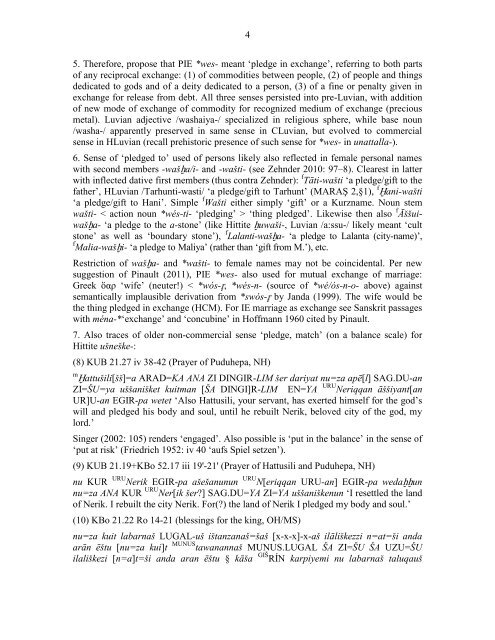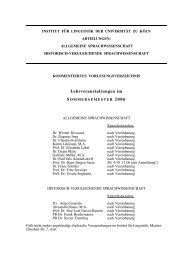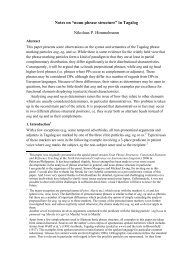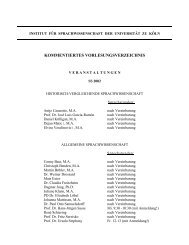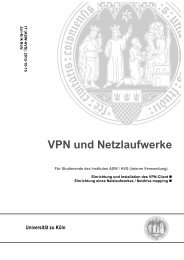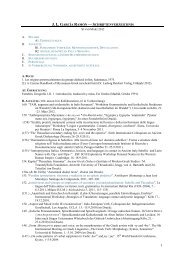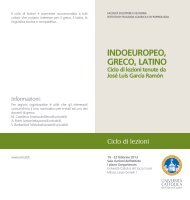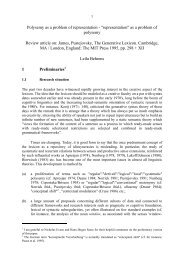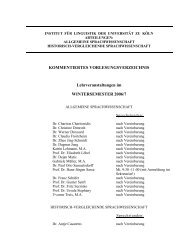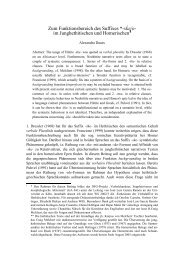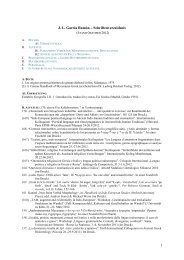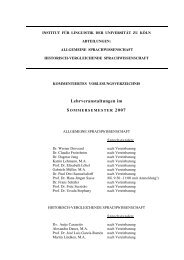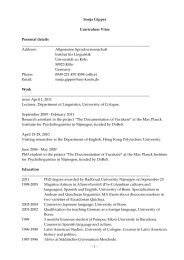Topics in Anatolian Historical Grammar Prof. Dr. H. Craig Melchert
Topics in Anatolian Historical Grammar Prof. Dr. H. Craig Melchert
Topics in Anatolian Historical Grammar Prof. Dr. H. Craig Melchert
You also want an ePaper? Increase the reach of your titles
YUMPU automatically turns print PDFs into web optimized ePapers that Google loves.
4<br />
5. Therefore, propose that PIE *wes- meant ‘pledge <strong>in</strong> exchange’, referr<strong>in</strong>g to both parts<br />
of any reciprocal exchange: (1) of commodities between people, (2) of people and th<strong>in</strong>gs<br />
dedicated to gods and of a deity dedicated to a person, (3) of a f<strong>in</strong>e or penalty given <strong>in</strong><br />
exchange for release from debt. All three senses persisted <strong>in</strong>to pre-Luvian, with addition<br />
of new mode of exchange of commodity for recognized medium of exchange (precious<br />
metal). Luvian adjective /washaiya-/ specialized <strong>in</strong> religious sphere, while base noun<br />
/washa-/ apparently preserved <strong>in</strong> same sense <strong>in</strong> CLuvian, but evolved to commercial<br />
sense <strong>in</strong> HLuvian (recall prehistoric presence of such sense for *wes- <strong>in</strong> unattalla-).<br />
6. Sense of ‘pledged to’ used of persons likely also reflected <strong>in</strong> female personal names<br />
with second members -wašḫa/i- and -wašti- (see Zehnder 2010: 97–8). Clearest <strong>in</strong> latter<br />
with <strong>in</strong>flected dative first members (thus contra Zehnder): f Tāti-wašti ‘a pledge/gift to the<br />
father’, HLuvian /Tarhunti-wasti/ ‘a pledge/gift to Tarhunt’ (MARAŞ 2,§1), f Ḫani-wašti<br />
‘a pledge/gift to Hani’. Simple f Wašti either simply ‘gift’ or a Kurzname. Noun stem<br />
wašti- < action noun *wés-ti- ‘pledg<strong>in</strong>g’ > ‘th<strong>in</strong>g pledged’. Likewise then also f Āššuiwašḫa-<br />
‘a pledge to the a-stone’ (like Hittite ḫuwaši-, Luvian /a:ssu-/ likely meant ‘cult<br />
stone’ as well as ‘boundary stone’), f Lalanti-wašḫa- ‘a pledge to Lalanta (city-name)’,<br />
f Malia-wašḫi- ‘a pledge to Maliya’ (rather than ‘gift from M.’), etc.<br />
Restriction of wašḫa- and *wašti- to female names may not be co<strong>in</strong>cidental. Per new<br />
suggestion of P<strong>in</strong>ault (2011), PIE *wes- also used for mutual exchange of marriage:<br />
Greek ὄαρ ‘wife’ (neuter!) < *wós- , *wés-n- (source of *wé/ós-n-o- above) aga<strong>in</strong>st<br />
semantically implausible derivation from *swós- by Janda (1999). The wife would be<br />
the th<strong>in</strong>g pledged <strong>in</strong> exchange (HCM). For IE marriage as exchange see Sanskrit passages<br />
with ména-*‘exchange’ and ‘concub<strong>in</strong>e’ <strong>in</strong> Hoffmann 1960 cited by P<strong>in</strong>ault.<br />
7. Also traces of older non-commercial sense ‘pledge, match’ (on a balance scale) for<br />
Hittite ušneške-:<br />
(8) KUB 21.27 iv 38-42 (Prayer of Puduhepa, NH)<br />
m Ḫattušili[šš]=a ARAD=KA ANA ZI DINGIR-LIM šer dariyat nu=za apē[l] SAG.DU-an<br />
ZI=ŠU=ya uššanišket kuitman [ŠA DINGI]R-LIM EN=YA URU Neriqqan āššiyant[an<br />
UR]U-an EGIR-pa wetet ‘Also Hattusili, your servant, has exerted himself for the god’s<br />
will and pledged his body and soul, until he rebuilt Nerik, beloved city of the god, my<br />
lord.’<br />
S<strong>in</strong>ger (2002: 105) renders ‘engaged’. Also possible is ‘put <strong>in</strong> the balance’ <strong>in</strong> the sense of<br />
‘put at risk’ (Friedrich 1952: iv 40 ‘aufs Spiel setzen’).<br />
(9) KUB 21.19+KBo 52.17 iii 19'-21' (Prayer of Hattusili and Puduhepa, NH)<br />
nu KUR URU Nerik EGIR-pa ašešanunun URU N[eriqqan URU-an] EGIR-pa wedaḫḫun<br />
nu=za ANA KUR URU Ner[ik šer?] SAG.DU=YA ZI=YA uššaniškenun ‘I resettled the land<br />
of Nerik. I rebuilt the city Nerik. For(?) the land of Nerik I pledged my body and soul.’<br />
(10) KBo 21.22 Ro 14-21 (bless<strong>in</strong>gs for the k<strong>in</strong>g, OH/MS)<br />
nu=za kuit labarnaš LUGAL-uš ištanzanaš=šaš [x-x-x]-x-aš ilāliškezzi n=at=ši anda<br />
arān ēštu [nu=za kui]t MUNUS tawanannaš MUNUS.LUGAL ŠA ZI=ŠU ŠA UZU=ŠU<br />
ilališkezi [n=a]t=ši anda aran ēštu § kāša GIŠ RÍN karpiyemi nu labarnaš taluqauš


